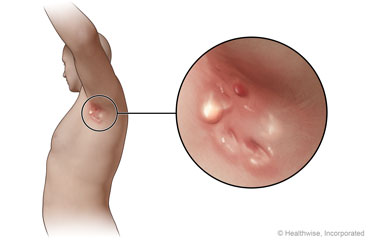
Overview
Hidradenitis suppurativa (say "hih-drad-uh-NY-tus sup-yur-uh-TY-vuh") is a skin condition that causes lumps on the skin that look like pimples or boils. The lumps are usually painful and can break open and drain blood and bad-smelling pus. The condition can come and go for many years.
Treatment for this condition may include antibiotics and other medicines. You may need surgery to remove the lumps. Home care includes wearing loose-fitting clothes and washing the area gently. You can help prevent lumps from coming back by staying at a healthy weight and not smoking.
Doctors don't know exactly how this condition starts. But they do know that something irritates and inflames the hair follicles, causing them to swell and form lumps. This skin condition can't be spread from person to person (isn't contagious).
Follow-up care is a key part of your treatment and safety. Be sure to make and go to all appointments, and call your doctor if you are having problems. It's also a good idea to know your test results and keep a list of the medicines you take.
How can you care for yourself at home?
Skin care
- Wash the area every day with mild soap. Use your hands rather than a washcloth or sponge when you wash that part of your body.
- Leave the affected areas uncovered when you can. If you have lumps that are draining, you can cover them with a bandage or other dressing. Put petroleum jelly (such as Vaseline) on the dressing to help keep it from sticking.
- Wear-loose fitting clothes that don't rub against the area. Avoid activities that cause skin to rub together.
- If you have pain, try a warm compress. Soak a towel or washcloth in warm water, wring it out, and place it on the affected skin for about 10 minutes.
 Medicines
Medicines
- Be safe with medicines. Take your medicines exactly as prescribed. Call your doctor if you think you are having a problem with your medicine. You will get more details on the specific medicines your doctor prescribes.
- If your doctor prescribed antibiotics, take them as directed. Do not stop taking them just because you feel better. You need to take the full course of antibiotics.
Lifestyle choices
- If you smoke, think about quitting. Smoking can make the condition worse. If you need help quitting, talk to your doctor about stop-smoking programs and medicines. These can increase your chances of quitting for good.
- Stay at a healthy weight, or lose weight, by eating healthy foods and being physically active. Being overweight could make this condition worse.
When should you call for help?
Call your doctor now or seek immediate medical care if:
- You have symptoms of infection, such as:
- Increased pain, swelling, warmth, or redness.
- Red streaks leading from the area.
- Pus draining from the area.
- A fever.
Watch closely for changes in your health, and be sure to contact your doctor if:
- You do not get better as expected.
Where can you learn more?
Go to http://www.healthwise.net/patientEd
Enter N962 in the search box to learn more about "Hidradenitis Suppurativa: Care Instructions".
Current as of: December 4, 2024
Author: Ignite Healthwise, LLC Staff
Clinical Review Board
All Ignite Healthwise, LLC education is reviewed by a team that includes physicians, nurses, advanced practitioners, registered dieticians, and other healthcare professionals.

